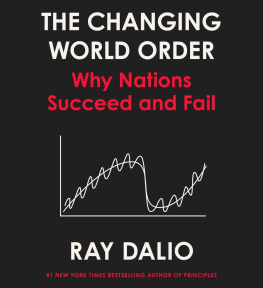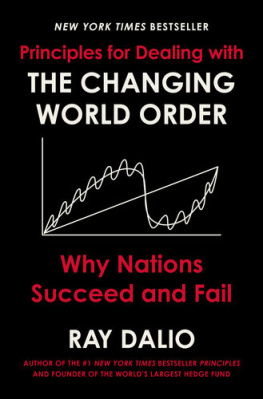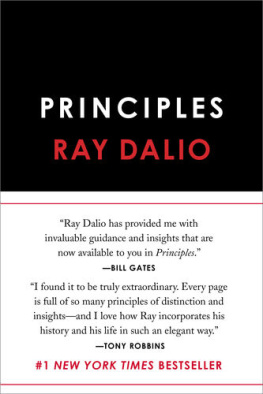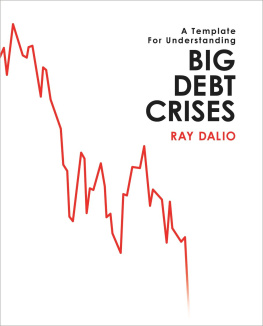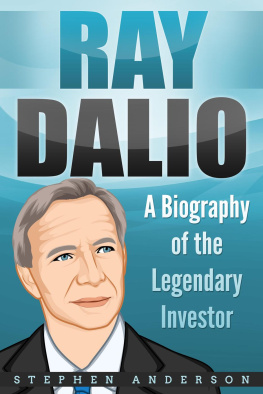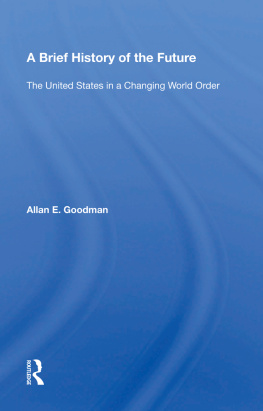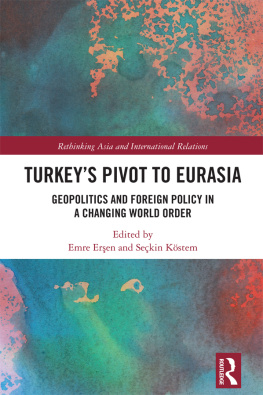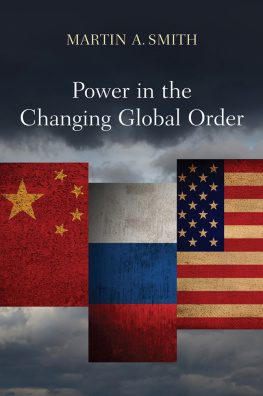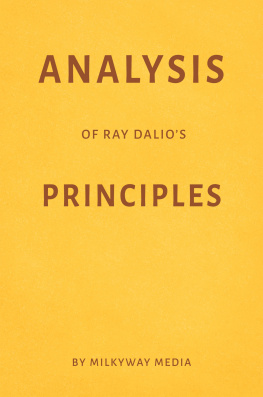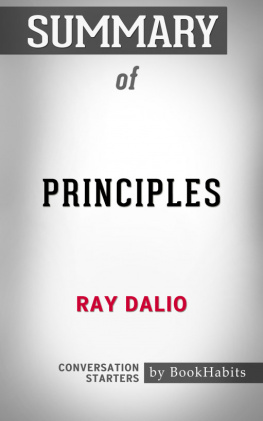Ray Dalio - The Changing World Order: Where we are and where were going
Here you can read online Ray Dalio - The Changing World Order: Where we are and where were going full text of the book (entire story) in english for free. Download pdf and epub, get meaning, cover and reviews about this ebook. year: 2020, genre: Politics. Description of the work, (preface) as well as reviews are available. Best literature library LitArk.com created for fans of good reading and offers a wide selection of genres:
Romance novel
Science fiction
Adventure
Detective
Science
History
Home and family
Prose
Art
Politics
Computer
Non-fiction
Religion
Business
Children
Humor
Choose a favorite category and find really read worthwhile books. Enjoy immersion in the world of imagination, feel the emotions of the characters or learn something new for yourself, make an fascinating discovery.
The Changing World Order: Where we are and where were going: summary, description and annotation
We offer to read an annotation, description, summary or preface (depends on what the author of the book "The Changing World Order: Where we are and where were going" wrote himself). If you haven't found the necessary information about the book — write in the comments, we will try to find it.
The Changing World Order: Where we are and where were going — read online for free the complete book (whole text) full work
Below is the text of the book, divided by pages. System saving the place of the last page read, allows you to conveniently read the book "The Changing World Order: Where we are and where were going" online for free, without having to search again every time where you left off. Put a bookmark, and you can go to the page where you finished reading at any time.
Font size:
Interval:
Bookmark:
Table of Contents
Published 03/29/20
I believe that the times ahead will be radically different from the times we have experienced so far in our lifetimes, though similar to many other times in history.
I believe this because about 18 months ago I undertook a study of the rises and declines of empires, their reserve currencies, and their markets, prompted by my seeing a number of unusual developments that hadnt happened before in my lifetime but that I knew had occurred numerous times in history. Most importantly, I was seeing the confluence of 1) high levels of indebtedness and extremely low interest rates, which limits central banks powers to stimulate the economy, 2) large wealth gaps and political divisions within countries, which leads to increased social and political conflicts, and 3) a rising world power (China) challenging the overextended existing world power (the US), which causes external conflict. The most recent analogous time was the period from 1930 to 1945. This was very concerning to me.
As I studied history, I saw that this confluence of events was typical of periods that existed as roughly 10- to 20-year transition phases between big economic and political cycles that occurred over many years (e.g., 50-100 years). These big cycles were comprised of swings between 1) happy and prosperous periods in which wealth is pursued and created productively and those with power work harmoniously to facilitate this and 2) miserable, depressing periods in which there are fights over wealth and power that disrupt harmony and productivity and sometimes lead to revolutions/wars. These bad periods were like cleansing storms that got rid of weaknesses and excesses, such as too much debt, and returned the fundamentals to a sounder footing, albeit painfully. They eventually caused adaptations that made the whole stronger, though they typically changed who was on top and the prevailing world order.
The answers to this question can only be found by studying the mechanics behind similar cases in historythe 1930-45 period but also the rise and fall of the British and Dutch empires, the rise and fall of Chinese dynasties, and othersto unlock an understanding of what is happening and what is likely to happen.[1] That was the purpose of this study. Then the pandemic came along, which was another one of those big events that never happened to me but happened many times before my lifetime that I needed to understand better.
While it might seem odd that an investment manager who is required to make investment decisions on short time frames would pay so much attention to long-term history, through my experiences I have learned that I need this perspective to do my job well. My biggest mistakes in my career came from missing big market moves that hadnt happened in my lifetime but had happened many times before. These mistakes taught me that I needed to understand how economies and markets have worked throughout history and in faraway places so that I could learn the timeless and universal mechanics underlying them and develop timeless and universal principles for dealing with them well.
The first of these big surprises for me came in 1971 when I was 22 years old and clerking on the floor of the New York Stock Exchange as a summer job. On a Sunday night, August 15, 1971, President Nixon announced that the US would renege on its promise to allow paper dollars to be turned in for gold. This led the dollar to plummet. As I listened to Nixon speak, I realized that the US government had defaulted on a promise and that money as we knew it had ceased to exist. That couldnt be good, I thought. So on Monday morning I walked onto the floor of the exchange expecting pandemonium as stocks took a dive. There was pandemonium all right, but not the sort I expected. Instead of falling, the stock market jumped about 4 percent. I was shocked. That is because I hadnt experienced a currency devaluation before. In the days that followed, I dug into history and saw that there were many cases of currency devaluations that had similar effects on stock markets. By studying further, I figured out why, and I learned something valuable that would help me many times in my future. It took a few more of those painful surprises to beat into my head the realization that I needed to understand all the big economic and market moves that had happened in the last 100+ years and in all major countries.
In other words, if some big and important event had happened in the past (like the Great Depression of the 1930s), I couldnt say for sure that it wouldnt happen to me, so I had to figure out how it worked and be prepared to deal with it well. Through my research I saw that there were many cases of the same type of thing happening (e.g., depressions) and that by studying them just like a doctor studies many cases of a particular type of disease, I could gain a deeper understanding of how they work. The way I work is to study as many of the important cases of a particular thing I can find and then to form a picture of a typical one, which I call an archetype. The archetype helps me see the cause-effect relationships that drive how these cases typically progress. Then I compare how the specific cases transpire relative to the archetypical one to understand what causes the differences between each case and the archetype. This process helps me refine my understanding of the cause-effect relationships to the point where I can create decision-making rules in the form of if/then statementsi.e., if X happens, then make Y bet. Then I watch actual events transpire relative to that template and what we are expecting. I do these things in a very systematic way with my partners at Bridgewater Associates.[1a] If events are on track we continue to bet on what typically comes next, and if events start to deviate we try to understand why and course correct.
My approach is not an academic one created for scholarly purposes; it is a very practical one that I follow in order to do my job well. You see, as a global macro investor, the game I play requires me to understand what is likely to happen to economies better than the competition does. From my years of wrestling with the markets and trying to come up with principles for doing it well, Ive learned that 1) ones ability to anticipate and deal well with the future depends on ones understanding of the cause-effect relationships that make things change and 2) ones ability to understand these cause-effect relationships comes from studying how they have played out in the past. How practical this approach has been can be measured in Bridgewaters performance track record over several decades.
Having done many such studies in pursuit of timeless and universal principles, Ive learned that most thingse.g., prosperous periods, depressions, wars, revolutions, bull markets, bear markets, etc.happen repeatedly through time. They come about for basically the same reasons, typically in cycles, and often in cycles that are as long or longer than our lifetimes. This has helped me come to see most everything as another one of those, just like a biologist, upon encountering a creature in the wild, would identify what species (or one of those) the creature belongs to, think about how that species of thing works, and try to have and use timeless and universal principles for dealing with it effectively.
Seeing events in this way helped shift my perspective from being caught in the blizzard of things coming at me to stepping above them to see their patterns through time.[2] The more related things I could understand in this way, the more I could see how they influence each othere.g., how the economic cycle works with the political oneand how they interact over longer periods of time. I also learned that when I paid attention to the details I couldnt see the big picture and when I paid attention to the big picture I couldnt see the details. Yet in order to understand the patterns and the cause-effect relationships behind them, I needed to see with a higher-level, bigger-picture perspective and a lower-level, detailed perspective simultaneously, looking at the interrelationships between the most important forces over long periods of time. To me it appears that most things evolve upward (improve over time) with cycles around them, like an upward-pointing corkscrew:
Next pageFont size:
Interval:
Bookmark:
Similar books «The Changing World Order: Where we are and where were going»
Look at similar books to The Changing World Order: Where we are and where were going. We have selected literature similar in name and meaning in the hope of providing readers with more options to find new, interesting, not yet read works.
Discussion, reviews of the book The Changing World Order: Where we are and where were going and just readers' own opinions. Leave your comments, write what you think about the work, its meaning or the main characters. Specify what exactly you liked and what you didn't like, and why you think so.

